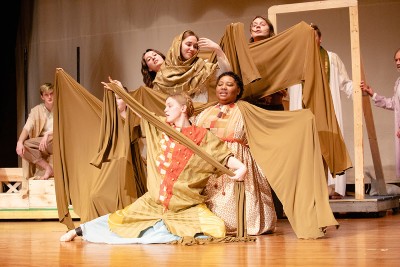
After the tumultuous last few years, Justin Poole and James Richardson felt a need to offer a message of faith and peace.
The two Eastern Mennonite University professors knew a theater production combining storytelling and music with a Biblical story could convey that message. They also knew the one-act opera “Noye’s Fludde” (Noah’s Flood) by Benjamin Britten, with its spectacular pageantry, music, drama and comedy, could give audiences a visceral experience of hope.
“We thought it would be a good post-pandemic piece that could bring the community together,” said Poole, who also directs EMU’s theater program. “We have all been through this monumental shift in our world, so let’s celebrate new beginnings together.”
“Today, it indeed seems all hell is breaking loose,” said Richardson, who teaches voice in the EMU Music Department. “We long for and look forward to the fullness that is to come … perfect peace. But I suppose the greater reminder is, even during the flood, God is sovereign.”
EMU’s production of “Noye’s Fludde” will be performed April 1, 2, 8, and 9 at 7 p.m. in Lehman Auditorium.
Noye’s Fludde show length is 75 minutes with no intermission. Masks are optional. $15/Adults; $12/Senior; $12/Student/Child non-EMU; $15/EMU faculty/staff; $6/EMU student. Add $2 per ticket at the door. Tickets may be purchased online or at the Box Office, located in the lower level of the University Commons, Monday-Friday, 10:30 a.m.-2:30 p.m. or call 540-432-4582.
An opera for all
“Noye’s Fludde” is not your typical opera,” said Richardson. Britten’s 1958 work was written to be performed by community members, including children, as well as professionals and amateurs.
“Britten conceived the opera for a range of ages and abilities spread throughout the orchestra and cast,” said Richardson. “The score is fun and eclectic.”
The opera’s animal chorus is multigenerational – “a real mix of local community members, whole families, local church musicians, school choristers, EMU students and a few members of the Shenandoah Valley Children’s Choir,” Richardson said.
The music includes congregational singing, trumpets played from the balcony, and a handbell ensemble. “The percussion parts call for ‘slung mugs’ that are struck by wooden spoons to sound like raindrops,” he said, “with an orchestra and organ that literally pulls out all the stops during a terrifying flood.”
Britten’s text is adapted from a 15th century Chester mystery or miracle play, and written in old English, Poole said. But the language shouldn’t be an obstacle for audiences, “because so much of the play’s story is conveyed through elaborate visuals and nuanced music…The audience members themselves will be active participants in the production, even singing along with the large cast in some music numbers.”
The Voice of God
Typically, God is played by one actor, but Poole took an innovative approach by casting three actors.
“God is not bound by our traditional perceptions of gender, ethnicity and culture. God is much more expansive, and more mysterious than the boxes we try to put God in,” Poole said. By casting three actors with diverse backgrounds, God’s own diversity and mystery could be more clearly communicated, he added.
The Voice of God is played by Rockingham County resident David Gonzol, emeritus professor of music at Shepherd University in West Virginia; senior psychology major Avery Trinh; and sophomore Greta Schrag, a political science and sociology major.
The three actors collaborated on their interpretations of resembling the Trinity. Gonzol represents God the Father; Trinh portrays the Son of God; and the Holy Spirit is represented by Schrag.
“Society tempts us to see the Father and Jesus as a bad cop and a good cop,” said Gonzol. “They are both equally kind and patient. So, I am not bringing an angry police attitude to the character, but rather one of deeply sad regret, though strongly clear that it is time to destroy much in a flood, and that that is a use of force.”
Trinh considers his faith background “somewhat unconditional” with his mother’s faith journey beginning in a conservative church and his father’s Vietnamese family identifying as Buddhist. “As these experiences continue to shape me, I am approaching the role of God as one of exploration and inquisition.”
The three actors feed off each other’s energy, Trinh said. “David, Greta and I are in constant conversation about how to make our roles unifying but also complementary to each of our gifts.”
Faith and doubt
Listening and surrendering to God’s Voice is a challenge for the lead characters. Noah is played by senior and music major Isaac Longacre. First-year Reah Clymer, majoring in music and peacebuilding, will portray Mrs. Noah.
“Noah is ready to follow God’s will. He gets a message from God…he begins to work on completing the ark with the help of his family,” said Longacre. “Of course, Noah still struggles with doubt and uncertainty. Noah decides that, despite his doubts, he will trust God.”
Not the case for Mrs. Noah. Clymer said her character fights to stay with her friends on dry land. “She is quite opposed to floating around on a boat with a hoard of wild animals.”
Mrs. Noah, realizing her friends will drown in the flood, is desperate to save them, Clymer said. “Mrs. Noah is an honest representation of the fear, grief and denial we humans experience during traumatic events.”
Although at first the opera’s demanding music seemed counterintuitive to Longacre, once he learned the music, “everything clicked into place, and it started to feel natural….the character is perfectly written into the music. ” he said. “When you sing, the music evokes certain emotions in the performer that perfectly fit what the character is feeling.”
The rainbow
“Noye’s Fludde” had the ability to inspire wonder, Longacre said, possibly making audience members contemplate the familiar story and “really think about what it was and what it would have been like.”
Even though there is loss and darkness in the story, Clymer said, “there is also opportunity and newness at the end of the story. There is a vibrant, promising rainbow after the rainstorm. I hope that the audience will be able to look at their own lives in the same way that Noah’s family looked at the new world after stepping off of the Ark. I hope this show refreshes us all so that we can better appreciate the newness in everyday life.”










